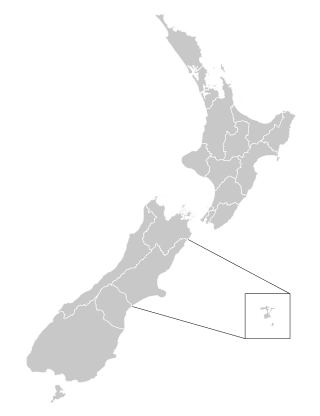Related Research Articles

The politics of New Zealand function within a framework of an independent unitary parliamentary representative democracy. The system of government is based on the Westminster system, and the legal system is modelled on the common law of England. New Zealand is a constitutional monarchy in which King Charles III is the sovereign and head of state, while his prime minister serves as the head of government.
The politics of Tuvalu takes place in a framework of a parliamentary representative democratic monarchy, whereby the Monarch is the head of state, represented by the Governor-General, while the Prime Minister is the head of government. Executive power is exercised by the government.

The prime minister of New Zealand is the head of government of New Zealand. The incumbent prime minister, Christopher Luxon, leader of the New Zealand National Party, took office on 27 November 2023.

The deputy prime minister of New Zealand is the second-most senior member of the Cabinet of New Zealand. The officeholder usually deputises for the prime minister at official functions. The current deputy prime minister is Winston Peters, who has held the position twice before, and will serve until 31 May 2025.

The House of Representatives is the sole chamber of the New Zealand Parliament. The House passes laws, provides ministers to form Cabinet, and supervises the work of government. It is also responsible for adopting the state's budgets and approving the state's accounts.

The Cabinet of New Zealand is the New Zealand Government's body of senior ministers, accountable to the New Zealand Parliament. Cabinet meetings, chaired by the prime minister, occur once a week; in them, vital issues are discussed and government policy is formulated. Cabinet is also composed of a number of committees focused on specific areas of governance and policy. Though not established by any statute, Cabinet has significant power in the New Zealand political system and nearly all bills proposed by Cabinet in Parliament are enacted.

Christopher Joseph Carter is a former New Zealand Labour Party and independent Member of the New Zealand Parliament. He was a senior Cabinet Minister in the Fifth Labour Government of New Zealand, serving lastly as Minister of Education, Minister Responsible for the Education Review Office and Minister of Ethnic Affairs. He was the Member of Parliament for the Te Atatu electorate, where he was first elected in 1993. He did not win re-election in 1996, but won a new and expanded Te Atatu seat in 1999. In 2010, he was suspended from the Labour Party caucus following a dispute with party leader Phil Goff, shortly afterwards he became an independent MP. He was expelled by the Labour Party for breaching the Party's constitution in bringing the Party in disrepute, on 11 October 2010. In September 2011 Carter resigned from Parliament following his appointment to a United Nations position in Afghanistan where he served for 4 years. In 2015 he was appointed to head UN operations in Rakhine State in Myanmar where he served for 3 years. In 2018 he rejoined the New Zealand Labour Party and stood for election as a Labour Party representative in the 2019 New Zealand local elections. Carter was elected and appointed as Chairperson of the Henderson Massey Local Board with 11,250 votes. He also won election in 2019 as one of the seven elected board members of the Waitemata District Health Board with 14,593 votes. Both positions have three year terms.

The Executive Council of New Zealand is the full group of "responsible advisers" to the governor-general, who advise on state and constitutional affairs. All government ministers must be appointed as executive councillors before they are appointed as ministers; therefore all members of Cabinet are also executive councillors. The governor-general signs a warrant of appointment for each member of the Executive Council, and separate warrants for each ministerial portfolio.

The Department of Conservation is the public service department of New Zealand charged with the conservation of New Zealand's natural and historical heritage.

Gerard Anthony Brownlee is a New Zealand politician and the 32nd speaker of the New Zealand House of Representatives. He was first elected as a member of the New Zealand House of Representatives for Ilam in 1996, representing the National Party. He became a list MP in 2020.

Ministers in the New Zealand Government are members of Parliament (MPs) who hold ministerial warrants from the Crown to perform certain functions of government. This includes formulating and implementing policies and advising the governor-general. Ministers collectively make up the executive branch of the New Zealand state. The governor-general is obliged to follow the advice of the prime minister on the appointment and dismissal of ministers.

District health boards (DHBs) in New Zealand were organisations established by the New Zealand Public Health and Disability Act 2000 under the Fifth Labour Government, responsible for ensuring the provision of health and disability services to populations within a defined geographical area. They existed from 1 January 2001, when the act came into force, to 30 June 2022. Initially there were 21 DHBs, and this was reduced to 20 organisations in 2010: fifteen in the North Island and five in the South Island. DHBs received public funding from the Ministry of Health on behalf of the Crown, based on a formula that took into account the total number, gender, age, socio-economic status and ethnic mix of their population. DHBs were governed by boards, which were partially elected and partially appointed by the minister of Health.

The governor-general of New Zealand is the representative of the monarch of New Zealand, currently King Charles III. As the King is concurrently the monarch of 14 other Commonwealth realms and lives in the United Kingdom, he, on the advice of his New Zealand prime minister, appoints a governor-general to carry out his constitutional and ceremonial duties within the Realm of New Zealand.

The New Zealand Government is the central government through which political authority is exercised in New Zealand. As in most other parliamentary democracies, the term "Government" refers chiefly to the executive branch, and more specifically to the collective ministry directing the executive. Based on the principle of responsible government, it operates within the framework that "the [King] reigns, but the government rules, so long as it has the support of the House of Representatives". The Cabinet Manual describes the main laws, rules and conventions affecting the conduct and operation of the Government.
The New Zealand Geographic Board Ngā Pou Taunaha o Aotearoa (NZGB) has authority over geographical and hydrographic names within New Zealand and its territorial waters. This includes the naming of small urban settlements, localities, mountains, lakes, rivers, waterfalls, harbours and natural features and may include researching local Māori names. It has named many geographical features in the Ross Sea region of Antarctica. It has no authority to alter street names or the name of any country.

The Ministry for Culture and Heritage is the department of the New Zealand Government responsible for supporting the arts, culture, built heritage, sport and recreation, and broadcasting sectors in New Zealand and advising government on such.

Sir Stephen Gerard "Tipene" O'Regan is a New Zealand academic and company director.

New Zealand's Law Commission was established in 1986 by the Law Commission Act 1985. The Commission is an independent Crown entity as defined in the Crown Entities Act 2004.

Eugenie Meryl Sage is a environmentalist and former New Zealand politician. Since the 2011 election, she has been a Green Party list MP in the House of Representatives and served as the Minister of Conservation and Land Information and the Associate Minister for the Environment from 2017 to 2020. She concluded her parliamentary term following the 2023 New Zealand general election.

New Zealand has a unitary system of government in which the authority of the central government defines sub-national entities. Local government in New Zealand has only the powers conferred upon it by the New Zealand Parliament. In general, local authorities are responsible for enabling democratic local decision-making and promoting the social, economic, environmental, and cultural well-being of their communities, as well as more specific functions for which they have delegated authority.
References
- 1 2 3 Cheyne, Christine (February 2016). "Reinvigorating the Vision: conservation boards' role in 21st-century nature conservation". Policy Quarterly. 12 (1): 60–69.
- ↑ "Role of NZCA". www.doc.govt.nz. Retrieved 6 January 2021.
- 1 2 "New Conservation Authority Chairperson announced". The Beehive. 29 January 2019. Archived from the original on 9 February 2019. Retrieved 23 November 2020.